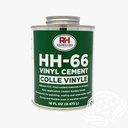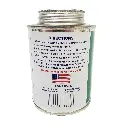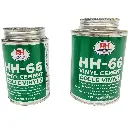- Tous les produits
- HH66 Vinyl Cement Glue
HH66 Vinyl Cement Glue
https://phoenixdomes.com/shop/hh66-vinyl-cement-glue-134 https://phoenixdomes.com/web/image/product.template/134/image_1920?unique=78bf0acDescription
4oz and 8oz cans are available. Each oz of vinyl cement is estimated to be sufficient for coating one square foot of material by the manufacturer.
For adhering vinyl to wood or other building materials, we recommend using Titebond Weathermaster sealant instead (which is also much easier to work with at low temperatures!)
General Application:
Ensure both surfaces to be joined are clean and dry. Sanding surfaces slightly can be a good idea for maximum holding power. Apply quickly, allowing the glue to sit for one minute on each surface before pressing the two together.
These pots of glue include a small brush under the lid that can assist with application, although if the surface area you intend to join is substantial you may wish to consider using a larger brush or foam applicator.
________
Cold Weather Application:
HH-66 is ideally applied at 15ºC/59ºF and above. If outdoor temperatures are less than this, bring your glue inside inside for a day or so in advance of installation so it can warm up to room temperature.
If cold temperatures are unavoidable, you'll want to keep the glue in your jacket until using it, and then use a hair dryer or heat gun (on low) to warm it during the application and setting phases, where it can ensure easier spreadability during application and improve bonding once surfaces have been joined together. It is recommended to apply vinyl cement to both surfaces intended to be joined, allowing them to sit separately for roughly a minute, and then joining them. Usually ~30s with a heat gun on low will be sufficient to warm a surface up prior to bonding, and an additional 30s-1m is a good idea during the setting phase.





